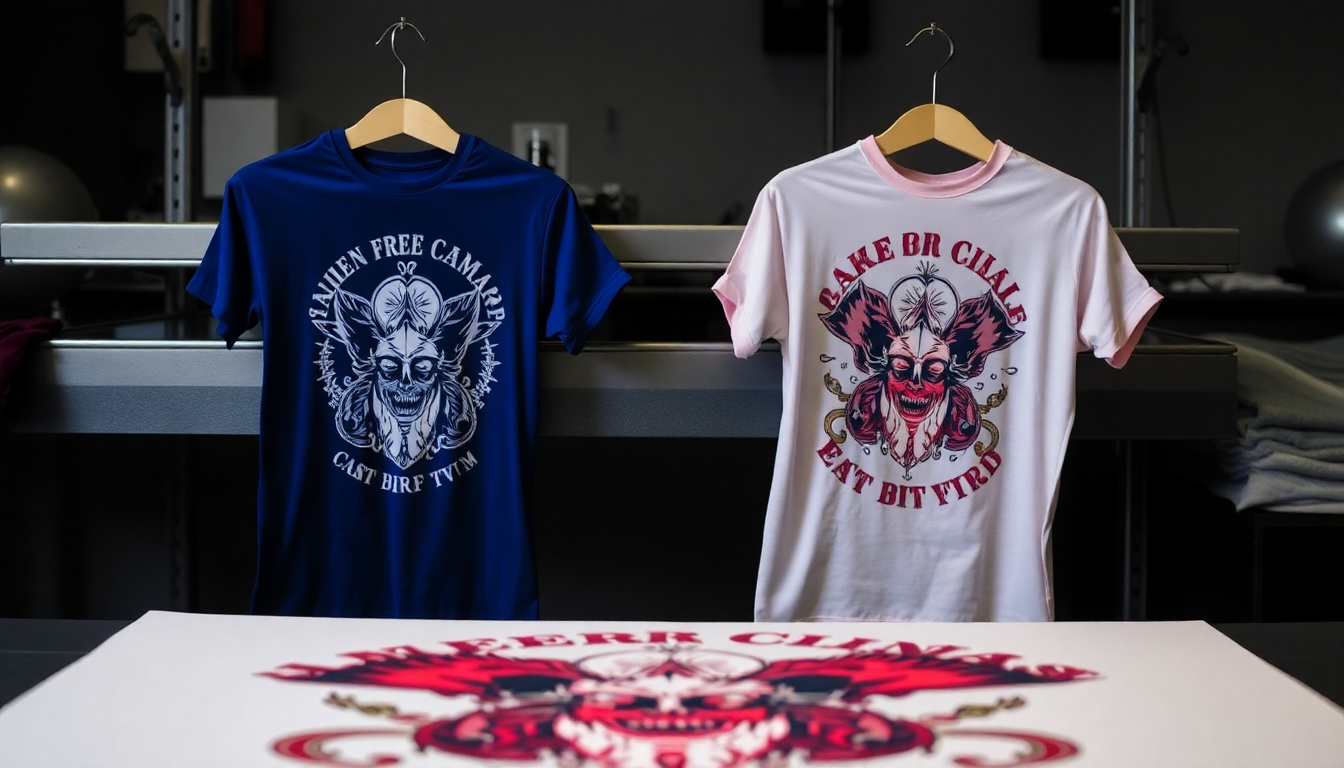T-Shirt Printing Methods and Their Advantages and Disadvantages
Introduction
T-shirts are a staple in fashion and personal expression. The way a design is printed can hugely impact the quality and look of the shirt. With many printing methods available, it can be tough to pick the right one. Popular techniques include screen printing, DTF printing, puff printing, DTG printing, and vinyl printing. This article will explore each method’s strengths and weaknesses to help you make the best choice for your next custom tee.
Screen Printing
What is Screen Printing?
Screen printing uses a mesh screen to transfer ink onto the fabric. Each color requires a separate screen, and ink is pressed through the screen to create the design. This method is common for large runs and simple color designs.
Advantages of Screen Printing
Screen printing offers high-quality, durable prints. The ink lies thick on the fabric, meaning designs last through many washes. It is also very cost-effective for large orders, reducing the price per shirt as quantities increase.
Disadvantages of Screen Printing
This method isn’t practical for small runs because of setup time and costs. Also, with each color needing a separate screen, designs with many colors can be expensive and limited in detail.
DTF Printing
What is DTF Printing?
DTF printing stands for Direct to Film printing. It involves printing designs onto a special film, which is then heat pressed onto the fabric. This newer method is growing quickly due to its flexibility.
Advantages of DTF Printing
DTF printing handles detailed designs with smooth gradients and many colors. It also works well on various fabrics, including cotton, polyester, and blends.
Disadvantages of DTF Printing
For small batches, costs can be a bit higher than other methods. Plus, DTF requires specialized equipment, which might limit its availability at some print shops.
Puff Printing
What is Puff Printing?
Puff printing adds a raised, 3D texture to the design by using a special ink that expands when heated. This gives the print a unique, puffy look.
Advantages of Puff Printing
The standout benefit is its textured appearance, which adds style and eye-catching detail to simple designs. It’s a fun option when you want to create a bold visual effect.
Disadvantages of Puff Printing
Puff printing can’t capture highly detailed or complex images well because of its thick texture. Some wearers may also find the raised print less comfortable, especially on large or elaborate designs.
DTG Printing
What is DTG Printing?
DTG printing means Direct to Garment printing. It uses specialized inkjet printers to spray ink directly onto the fabric. This method is ideal for detailed and colorful designs.
Advantages of DTG Printing
DTG printing reproduces intricate patterns and vibrant colors flawlessly. It’s perfect for small orders or custom pieces, as there’s minimal setup time.
Disadvantages of DTG Printing
DTG prints aren’t as durable as screen prints; they may fade after many washes. Additionally, DTG works best on light-colored fabrics, as dark fabrics require a white base layer for the colors to pop.
Vinyl Printing
What is Vinyl Printing?
Vinyl printing involves cutting out designs from colored vinyl sheets and heat pressing them onto the t-shirt. It’s often used for lettering and simple graphics.
Advantages of Vinyl Printing
Vinyl prints shine with vibrant colors and crisp edges. The prints last long and can withstand frequent washing without cracking or fading.
Disadvantages of Vinyl Printing
This method struggles with complex images or designs with lots of color gradients. Vinyl applications can also feel heavy or stiff on the shirt, which might affect comfort.
Conclusion
Choosing a t-shirt printing method depends on your design, order size, and fabric. Screen printing excels for bulk orders and simple designs but isn’t cost-effective for small quantities. DTF printing offers full-color, detailed prints on various fabrics, ideal for versatile projects. Puff printing adds cool textured effects but limits detail and comfort. DTG printing is great for small batches with colorful designs but doesn’t last as long on dark fabrics. Vinyl printing provides sharp, durable prints for clear lettering but falls short on complex artwork.
Consider what matters most for your project—durability, color range, order size, or fabric type—before choosing a printing technique. At PUNK, we offer expert advice to help bring your vision to life with the best printing method. Whether you want a simple screen print or a bold puff print, we’ve got you covered for standout custom tees.

